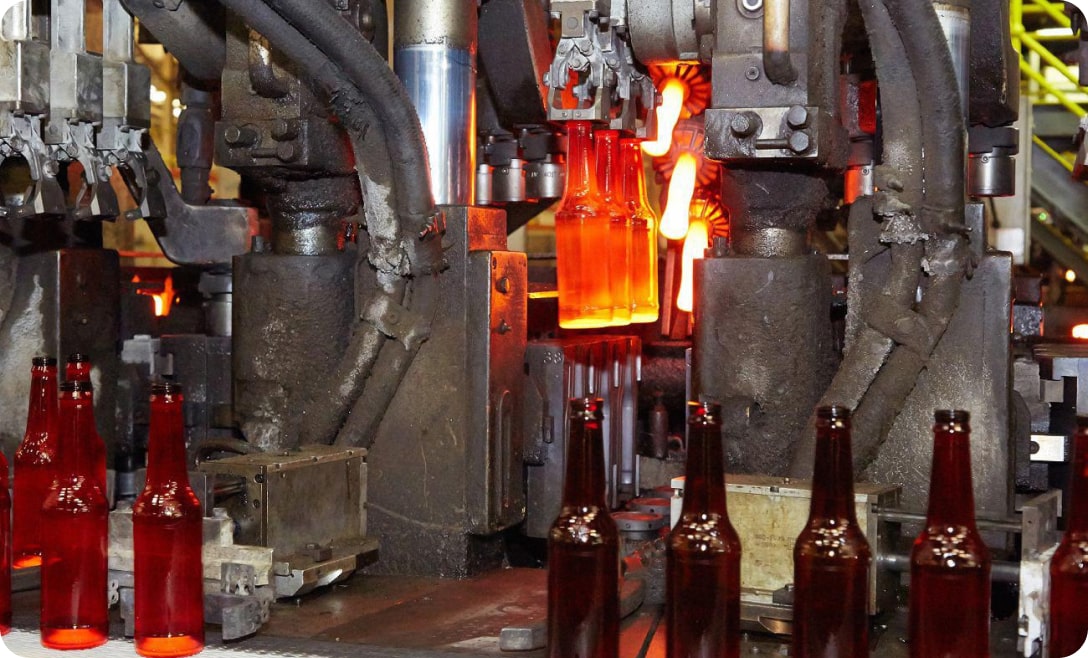Production
The plant has introduced a new generation of advanced equipment to produce glass containers for the world's leading companies.
Today, the plant produces flint glass and colored glass (brown and green).

Glass workshops::
№1
ZIPPE (Germany) - a dosing and mixing line, HORN (Germany) - a glass furnace with a capacity of 240 tons per day, Emhart (Switzerland) - glass forming machines, 3 pcs, HORN (Germany) - hot and cold strengthening systems, LfG (Germany) - a glass container annealing furnace, EmhartInex (USA) - VeritasiM control devices, Steklopak (Russia) - equipment for transportation and packaging of glass containers.
№2
ZIPPE (Germany) - dosing and mixing line, SORG (Germany) - glass furnace, capacity 320 tons per day, Emhart (Switzerland) - glass molding machines, 3 pcs, Imaco (Netherlands) - hot strengthening system, Antonini (Italy) - cold strengthening system, Antonini (Italy) - glass container annealing furnace, MSC & SGCC (France) - control machines, OptischePrüfsystemeDr.Günther (Germany) - optical control machines (control of the whisk - concavity and non-parallelism), Zeccetti (Italy) - equipment for transportation and packaging of glass containers of the machine line.

The glass is produced in our state-of-the-art glass furnaces. The control of these furnaces is fully automated and subject to strict control to a high level of accuracy. The glass mass is cooked using an advanced approach, where natural gas with a calorific value of 8060 to 8100 kcal/m3 is mainly used as a fuel.
8060-8100 kcal/m3
In order to reduce energy consumption and CO and NOx emissions into the environment, a combined flame-electric heating method was used to heat glass furnaces, where heat is introduced by a fuel flare and additional electricity from electrodes. Volumetric silos are used to store raw materials, which ensures high-quality storage. Bulk materials are transported to the silos by pneumatic conveying systems, which almost completely prevents dusting, provides more gentle movement of the substance, deformation of the substance structure is minimal, and there is no stratification. The main advantage of the composite shop is a line for dosing and mixing raw materials from the German company ZIPPE. The German quality of the equipment and a sophisticated electronic control system based on Siematic industrial controllers allow for very accurate and high-quality preparation of the charge for further use.
Our company produces glass containers using EmhartGlass IS-5 and IS-6 1/4 glass molding machines with 8 to 12 sections. These machines operate in single-, double- and triple-gob modes (SG, DG and TG), producing glass containers in three possible ways:
- BB (Blow and Blow) An invaluable advantage of this glass blowing method is the ability to form glass bottles of various types and purposes.
- PB (Press Blow). An efficient molding method that is rapidly developing and spreading in the production of narrow-mouth hollow thin-walled products - lightweight glass containers.
- NNPB (Narrow Neck Press and Blow) This method is characterized by an even distribution of glass and the absence of the so-called "feeder belt" - waviness on the body of the product. The weight savings are 20-30%, and the speed of glass blowing machines increases by 10-15%.
The quality of the components, their preparation, storage, and the method of their dosing and mixing determine the quality of the finished product
The finished product, which has passed quality control, is transported to the packaging unit by a conveyor system
glass containers in shrink wrap. It is very important to pack the dishes well for further storage in the warehouse and
further transportation of finished products to the consumer. For this purpose, fully automatic
column-type palletizers from the Italian company Zecchetti and shrinking equipment from the French company Thimon. Packaging is carried out in two stages: packaging and shrinking of the pallet itself, then a special film is additionally glued to the top of the pallet to protect it from UV rays, precipitation, etc.
This equipment and a modern control system based on Simatik industrial controllers ensure very high quality and high-speed packaging of finished products.
It is possible to pack products in small mono-packs. To do this, we use packaging equipment from Thermopack. All products are stored in our own covered, clean and dry production warehouses.
Another advantage of Piskovskiy Glassworks is its own modern transformer substation
110/10 kV. This substation provides high-quality power supply to all the plant’s equipment, ensuring its long-term use without emergency failures.